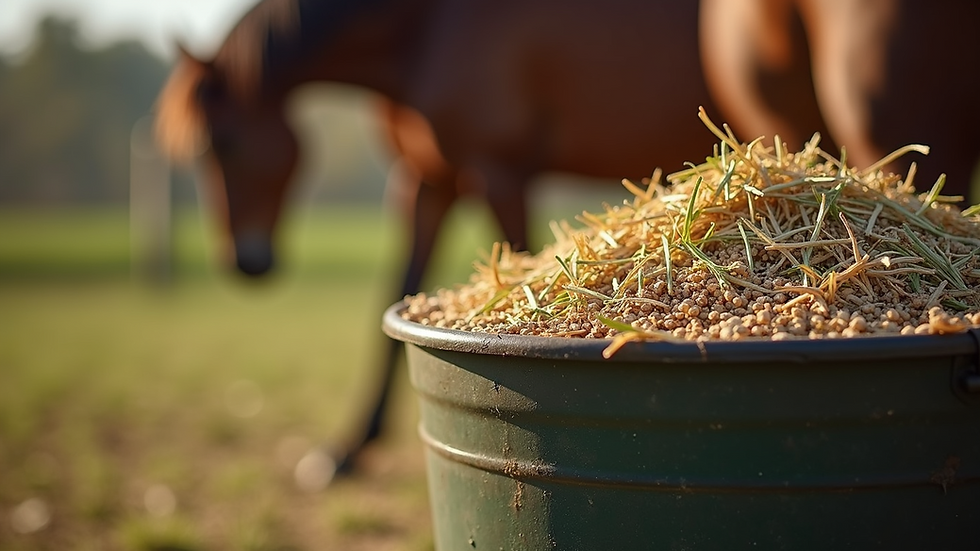Essential Guidelines for Optimizing Horse Nutrition for Peak Performance
- Becka Sykes
- May 29, 2025
- 4 min read
Horse nutrition is a cornerstone of equine health and performance. Just like athletes require a balanced diet to excel, horses need the right mix of nutrients to reach their peak capabilities. This blog post will cover essential guidelines to help horse owners optimize their horses' nutrition, ensuring vitality, stamina, and overall well-being.
Understanding Equine Nutritional Needs
Horses are herbivores, and their digestive systems are designed to process forage. The primary components of a horse's diet typically include forage (hay or pasture), grains, vitamins, and minerals. Understanding the specific needs of your horse based on its age, breed, weight, workload, and health is vital for crafting an effective feeding plan.
The horse’s diet should be rich in fiber, as this is crucial for optimal digestion and gut health. Ideally, a horse should consume 1.5-2% of its body weight in forage each day, with a focus on high-quality hay or pasture.
Forage: The Foundation of a Horse's Diet
High-quality forage serves as the base of a horse's diet. Not only does it provide essential fiber, but it is also packed with nutrients vital for energy and body maintenance. Horse owners should ensure their horses receive access to unlimited forage whenever possible.
Different types of hay, such as timothy, alfalfa, and orchard grass, provide various nutrient profiles. While alfalfa hay is richer in protein and calcium, timothy hay offers a good balance of fiber and nutrients, making it important to select the right type to match your horse's needs.
The Role of Grains in Horse Nutrition
While forage is critical, many horses also benefit from grains, especially those engaged in heavier workloads. Grains provide concentrated energy and essential nutrients but should be introduced carefully and in moderation to avoid digestive issues.
Common grains for horses include oats and sweet feed blends. When adding grains, consider factors such as the horse's age, activity level, and body condition to ensure the proper balance of nutrients without overfeeding.
Vitamins and Minerals: The Unsung Heroes
Horses, much like humans, require a variety of vitamins and minerals for optimal health. Although they can obtain many of these from forage, certain factors—such as poor-quality hay, geographical location, or restricted diets—may create deficiencies.
Supplementing vitamins such as A, D, and E, as well as minerals like calcium, phosphorus, and magnesium, is crucial for maintaining bone health, muscle function, and overall vitality. It's always advisable to consult with a veterinarian or an equine nutritionist before adding supplements to your horse's diet, to ensure they meet your horse’s specific needs.

Feeding Strategy: Timing and Quantity Matter
Feeding frequency and portion control are essential to prevent digestive problems, especially colic, which can be life-threatening. Horses are natural grazers and thrive on numerous small meals throughout the day rather than two or three large meals.
Feeding guidelines suggest splitting a horse’s daily ration into multiple smaller feedings spaced throughout the day and adjusting the quantities based on the horse’s size, activity, and climate. This approach helps mimic natural grazing habits and keeps the digestive system functioning smoothly.
Monitoring Body Condition and Adjusting Diet
Regularly monitoring your horse's body condition is crucial to ensure proper nutrition. A horse that is too thin may need additional energy sources, while an overweight horse requires a diet plan to reduce caloric intake.
Body condition scoring systems can help assess whether a horse is at an ideal weight and inform necessary dietary adjustments. Be mindful that changes in weight or condition may take time, and avoid making drastic changes to the diet all at once.
Role of Water in Equine Nutrition
Water is often overlooked but is an essential component of horse nutrition. Horses require a constant supply of fresh, clean water, especially if they are consuming forage or grains. A dehydrated horse can experience lethargy, poor digestion, and serious health issues.
On average, a horse drinks 5 to 10 gallons of water a day, but this can vary based on workload, temperature, and forage content. Always make sure your horse has access to water, especially after exercise.
Common Nutritional Mistakes to Avoid
Many horse owners inadvertently make common feeding mistakes that can impact their horse's health and performance. Here are a few pitfalls to watch out for:
Overfeeding Grains: Providing excessive grains can lead to metabolic issues and digestive disruptions.
Ignoring Forage Quality: Feeding poor-quality hay or browsing less grassy pastures can deprive horses of essential nutrients.
Neglecting Supplements: Failing to address specific dietary deficiencies with appropriate supplements can hinder your horse's overall performance and health.
By recognizing these mistakes and focusing on a balanced diet, horse owners can significantly improve their horses' well-being and performance.
Conclusion
Optimizing horse nutrition is crucial for achieving peak performance and maintaining overall health. By prioritizing high-quality forage, balancing grains, supplementing vital vitamins and minerals, and monitoring hydration, owners will set their horses up for success.
Implementing these essential guidelines not only enhances performance but also fosters a deeper bond between horse and owner. Remember, each horse is unique, and consulting with a professional ensures that every aspect of your horse's diet meets their specific needs.
Taking the time to understand and cater to your horse’s nutritional requirements can lead to a happier, healthier equine companion ready to excel in every endeavor.




Comments